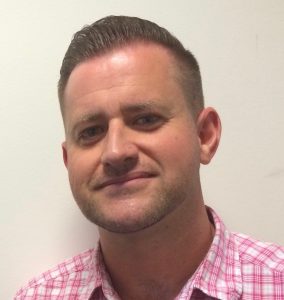An unexpected mental health nursing journey
By Brent Hayward

In this series, ACMHN members talk about their passion for mental health nursing and how they have developed professionally. In his story, Brent Hayward talks about his unusual career working in a government department as a mental health nurse, and how his qualifications have helped him shape government policy to achieve better outcomes for consumers.
I don’t clearly recall how mental health nursing became my specialisation. But I do remember that my undergraduate nursing degree (nearly 20 years ago) was three and a half years long and had two mental health subjects. I had somewhat of a typical mental health nurse (MHN) foundational experience, I completed my graduate year in psychiatry, then worked in acute and community mental health. I completed my postgraduate diploma in psychiatric nursing, spent time working in a homeless outreach team and nursing education before I ventured into working state-wide. This is where I first started to present at conferences and when I published my first peer-reviewed article. This is also where my MHN career took an unexpected turn, buoyed by my credentialing as an MHN.
Working with people with intellectual and developmental disability had always been my true professional interest. I was able to combine that with mental health nursing when I worked in a state-wide mental health service for people with intellectual disability. My clinical disability career took off at this point and I moved into state government, and this is where I remained since. Not very typical for an MHN – or is it?
Nurses broadly aren’t known for ‘tooting their own horn’. We get on with the work with the aim to deliver meaningful outcomes for people. We try and fill the gaps in services, to make sure people aren’t missing out on the treatments and supports they need. Perhaps we can do more to privilege just a little time to (quietly) say, “this is what mental health nursing brings to the table”.
On reflection, I think this is something I’ve been trying to accomplish. I’ve sometimes felt professionally isolated since beginning work in state government. While I’ve been surrounded by a couple of MHNs and even a few more allied health colleagues, I think I will always miss the comradery of a dedicated team of nurses, mental health or otherwise. But that hasn’t curtailed my own professional development.
I was eager to complete a master’s degree and after a few false starts I fell into, dare I say it again, an atypical one. There were two course requirements for me: it had to be disability-specific and not clinically orientated. This was the beginning of my turn away from a clinical nursing perspective in my work (but note the ‘clinical’ part. More about this soon).
I did well in my master of special education degree. I enjoyed the challenge and insights of a new discipline and delving into pedagogy, curriculum, and instructional techniques. I was able to contribute my unique MHN perspective in my course assessments. My course coordinator not-so-jokingly said she’ll keep in touch because she wanted me to complete a PhD.
Fast forward a few years and I’m active in a few professional associations and I have more publications and conference presentations in my CV. These are predominantly in the disability field but more recently I’ve turned my attention back to nursing to explore nursing practice in government.
And that brings me to the last six years. That PhD is close to being submitted, and I’m still in state government but have joined the Department of Education and Training. I’ve been fortunate to build on my experience, skills, achievements, and interests to now lead the Department’s broad work in behaviour support, restraint and seclusion, and health workforces. Working in state government has instilled in me the importance of social determinants of health. I’m not sure I really appreciated this as an undergraduate nursing student, or as a clinical nurse working in public mental health.
Where one lives, the challenges of one’s family circumstances, education, friendships, employment, personal achievements, and of course disability are many of the things which shape physical and mental health. And all these things are influenced by government policy and service provision. I’ve been drawn to better understand and improve the systems in which services are provided. This is the space I now work and research in. It is a far cry from working with individual people with mental health needs, but without that practice experience I would not have the depth and breadth from which to draw from to inform the work I now do.
I could never have imagined this trajectory of my MHN career. Clinical work is now a small part of my role and when I can dip back into it, I relish the opportunity. The ability to concurrently see the ‘big and small pictures’ is a challenge in my work but one which sustains me because this is where I apply my MHN perspective.
Many people have helped me to be successful as an MHN, both professionally and personally. This ends with a shout-out to you.
To contact me or see my research and publications, head to ResearchGate.

Brent Hayward is the Principal Behaviour Support Adviser in the Victorian Department of Education and Training and a Credentialed Mental Health Nurse. His 20 years of work in mental health has been primarily in the areas of intellectual and developmental disabilities and state government. He is close to completing a PhD investigating the adoption of a practice framework in the NDIS.
TAGS Australian College of Mental Health Nurses membership, mental health career change, mental health nursing career, mental health policy Australia